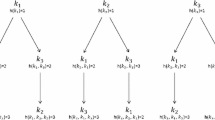Abstract
We consider the problem of allocating several homogeneous indivisible goods when monetary transfers among agents are possible. We study the possibility of constructing strategy-proof and Pareto efficient mechanisms on restricted domains of agents’ valuation profiles. We show that there is no strategy-proof and Pareto efficient mechanism under the weak domain condition that all agents’ sets of possible valuations share at least four common valuations satisfying a certain inequality. Moreover, we prove that this impossibility result is robust to any affine transformation of domains, and we examine this impossibility result when the set of agent’s possible valuations consists of finite integers.
Similar content being viewed by others
Notes
We mention two important contributions in quasilinear environments. For queueing problems, Mitra (2001) provides a characterization of restricted domains (e.g., linear waiting costs) for the existence of a strategy-proof and Pareto efficient mechanism. For the public good provision, Liu and Tian (1999) establish a characterization of restricted domains (e.g., quadratic preferences) for the existence of a strategy-proof and Pareto efficient mechanism.
Schummer (2000) provides a comprehensive set of results about strategy-proof mechanisms in the problem of allocating heterogeneous indivisible goods when monetary transfers are possible. The second result is essentially the same as his impossibility result (Theorem 5) in the case of two agents and two heterogeneous indivisible goods.
The definitions depend on n and s. Because there is no fear of confusion, we omit to write n and s in the definitions.
When \(k=0\), this sentence is not necessary for the discussion.
When \(k=s\), we can understand the discussion more easily by replacing \(t_{i}(d_{i},v_{-i}^{S})\) with \(t_{i}(d_{i},v_{-i}^{S\backslash \{i\}})\).
When \(k=n\), this sentence is not necessary for the discussion.
It is important to study general models where each agent receives any number of the (homogeneous or heterogeneous) indivisible goods. We predict the impossibility results of strategy-proof and Pareto efficient mechanisms on small domains. However, Theorem 1 can not be easily extended to those models since the structure of decision-efficient allocations of indivisible goods is more complicated (in particular, when there are ties). Therefore, we leave the question of whether the impossibility results hold on small domains in those models.
The existence of four common valuations requires \(l\ge 4\), and we will show that the premise of this theorem requires \(l\ge 4\).
Ohseto (2000) shows that when \(s=1\) and \(l>\frac{2^{n}+2n^{2}-n-3}{n-1}\), there is no strategy-proof and Pareto efficient mechanism. The minimum l in the new result is less than half of the minimum l in his result since \(\frac{2^{n}+2n^{2}-n-3}{n-1}\ge 2(\frac{2^{n-1} +2n-3}{n-1})+1\). Therefore, the new result is a stronger impossibility result.
Let \(n=2,\) \(s=1,\) \(v_{1}=3,\) \(v_{2}=2\), and \(Z^{\prime }=\{((s_{1},t_{1}),(s_{2},t_{2}))\in Z\mid \) \(t_{1}\in \{4m|\) m is an integer\(\}\) and \(t_{2}\in \{5m|\) m is an integer\(\}\}\). Then, a feasible allocation \(((s_{1},t_{1}),(s_{2},t_{2}))=((0,-8),(1,5))\) is neither decision-efficient nor budget balanced, but is Pareto efficient.
References
Ashlagi I, Serizawa S (2012) Characterizing Vickrey allocation rule by anonymity. Soc Choice Welf 38:531–542
Barberà S (2001) An introduction to strategy-proof social choice functions. Soc Choice Welf 18:619–653
Barberà S (2012) Strategyproof social choice. In: Arrow KJ, Sen A, Suzumura K (eds) Handb Soc Choice Welf, vol 2. North-Holland, Amsterdam, pp 729–831
Chew SH, Serizawa S (2007) Characterizing the Vickrey combinatorial auction by induction. Econ Theory 33:393–406
Gibbard A (1973) Manipulation of voting schemes: a general result. Econometrica 41:587–601
Groves T (1973) Incentives in teams. Econometrica 41:617–631
Holmström B (1979) Groves’ scheme on restricted domains. Econometrica 47:1137–1144
Kato M, Ohseto S, Tamura S (2015) Strategy-proofness versus symmetry in economies with an indivisible good and money. Int J Game Theory 44:195–207
Liu L, Tian G (1999) A characterization of the existence of optimal dominant strategy mechanisms. Rev Econ Des 4:205–218
Mitra M (2001) Mechanism design in queueing problems. Econ Theory 17:277–305
Miyagawa E (2001) House allocation with transfers. J Econ Theory 100:329–355
Moulin H (2009) Almost budget-balanced VCG mechanisms to assign multiple objects. J Econ Theory 144:96–119
Ohseto S (1999) Strategy-proof allocation mechanisms for economies with an indivisible good. Soc Choice Welf 16:121–136
Ohseto S (2000) Strategy-proof and efficient allocation of an indivisible good on finitely restricted preference domains. Int J Game Theory 29:365–374
Ohseto S (2004) Implementing egalitarian-equivalent allocation of indivisible goods on restricted domains. Econ Theory 23:659–670
Ohseto S (2006) Characterizations of strategy-proof and fair mechanisms for allocating indivisible goods. Econ Theory 29:111–121
Pápai S (2003) Groves sealed bid auctions for heterogeneous objects with fair prices. Soc Choice Welf 20:371–385
Saitoh H, Serizawa S (2008) Vickrey allocation rule with income effect. Econ Theory 35:391–401
Sakai T (2008) Second price auctions on general preference domains: two characterizations. Econ Theory 37:347–356
Satterthwaite MA (1975) Strategy-proofness and Arrow’s conditions: existence and correspondence theorems for voting procedures and social welfare functions. J Econ Theory 10:187–217
Schummer J (1997) Strategy-proofness versus efficiency on restricted domains of exchange economies. Soc Choice Welf 14:47–56
Schummer J (2000) Eliciting preferences to assign positions and compensation. Games Econ Behav 30:293–318
Sprumont Y (1995) Strategy-proof collective choice in economic and political environments. Can J Econ 28:68–107
Sprumont Y (2013) Constrained-optimal strategy-proof assignment: beyond the Groves mechanisms. J Econ Theory 148:1102–1121
Svensson L-G, Larsson B (2002) Strategy-proof and nonbossy allocation of indivisible goods and money. Econ Theory 20:483–502
Vickrey W (1961) Counterspeculation, auctions, and competitive sealed tenders. J Financ 16:8–37
Yengin D (2012) Egalitarian-equivalent Groves mechanisms in the allocation of heterogeneous objects. Soc Choice Welf 38:137–160
Acknowledgements
We would like to thank an associate editor, two anonymous referees, Miki Kato, and Zhen Zhao for helpful suggestions and detailed comments. This research was partially supported by JSPS KAKENHI Grant number 17K03614.
Author information
Authors and Affiliations
Corresponding author
Additional information
Publisher's Note
Springer Nature remains neutral with regard to jurisdictional claims in published maps and institutional affiliations.
Rights and permissions
About this article
Cite this article
Ohseto, S. Strategy-proof and Pareto efficient allocation of indivisible goods: general impossibility domains. Int J Game Theory 50, 419–432 (2021). https://doi.org/10.1007/s00182-021-00754-4
Accepted:
Published:
Issue Date:
DOI: https://doi.org/10.1007/s00182-021-00754-4



